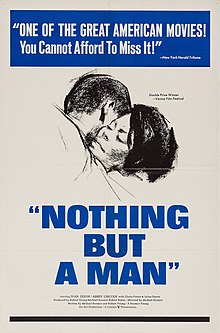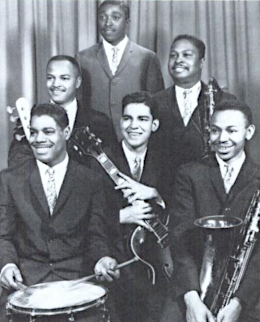
The Funk Brothers were a group of Detroit-based session musicians who performed the backing to most Motown recordings from 1959 until the company moved to Los Angeles in 1972.

Yaphet Frederick Kotto was an American actor for film and television. His films include the science-fiction horror film Alien (1979), the neo-noir action thriller Across 110th Street (1972), the science-fiction action film The Running Man (1987), the James Bond film Live and Let Die (1973) in which he portrayed the main villain Dr. Kananga, and the action comedy Midnight Run (1988). He also starred in the NBC television series Homicide: Life on the Street (1993–1999) as Lieutenant Al Giardello.
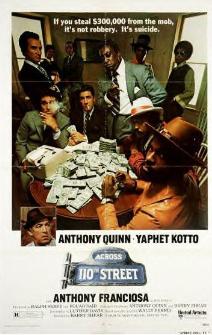
Across 110th Street is a 1972 American neo noir action thriller film directed by Barry Shear and starring Yaphet Kotto, Anthony Quinn, Anthony Franciosa and Paul Benjamin. The film is set in Harlem, New York and takes its name from 110th Street, the traditional dividing line between Harlem and Central Park that functioned as an informal boundary of race and class in 1970s New York City.
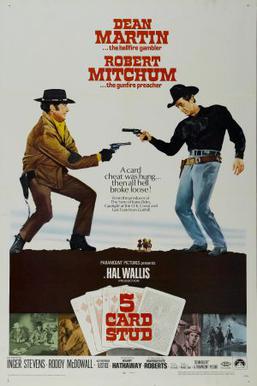
5 Card Stud is a 1968 American Western mystery film, directed by Henry Hathaway and starring Dean Martin and Robert Mitchum. The script is based on a novel by Ray Gaulden and was written by Marguerite Roberts, who also wrote the screenplay of True Grit for Hathaway the following year.

Ivan Nathaniel Dixon III was an American actor, director, and producer best known for his series role in the 1960s sitcom Hogan's Heroes, and for his starring roles in the 1964 independent drama Nothing But a Man and the 1967 television film The Final War of Olly Winter. In addition, he directed many episodes of television series.

Joseph Lucian Messina was an American guitarist. Dubbed the "white brother with soul", he was one of the most prolific guitarists in Motown Records' in-house studio band, the Funk Brothers.

Blue Collar is a 1978 American crime drama film directed by Paul Schrader in his directorial debut. Written by Schrader and his brother Leonard, the film stars Richard Pryor, Harvey Keitel and Yaphet Kotto. The film is both a critique of union practices and an examination of life in a working-class Rust Belt enclave.

"Saturday Night Special" is a song by American rock band Lynyrd Skynyrd. It is the opening track on their album Nuthin' Fancy. The song addresses fatal tragedies involving guns.
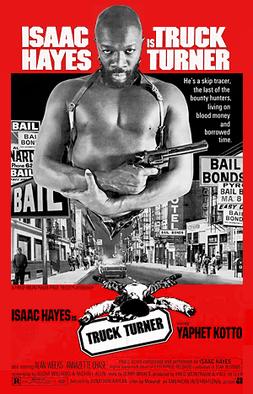
Truck Turner, also known as Black Bullet, is a 1974 American blaxploitation film, starring Isaac Hayes and Yaphet Kotto, and directed by Jonathan Kaplan. The screenplay was written by Michael Allin, Leigh Chapman, and Oscar Williams. Hayes also scored the music for the soundtrack. The film was released by American International Pictures as a double feature with Foxy Brown.
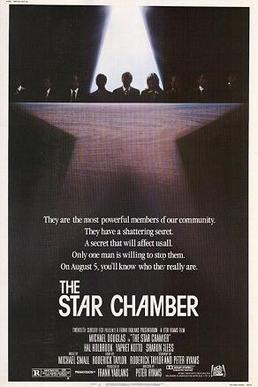
The Star Chamber is a 1983 American crime thriller film starring Michael Douglas, Hal Holbrook,1 Yaphet Kotto, Sharon Gless, James B. Sikking, and Joe Regalbuto. The film was written by Roderick Taylor and Peter Hyams and directed by Hyams. Its title is taken from the name of the Star Chamber, a 15th−17th-century English court.

The Running Man is a 1987 American dystopian action film directed by Paul Michael Glaser and starring Arnold Schwarzenegger, María Conchita Alonso, Richard Dawson, Yaphet Kotto, and Jesse Ventura. The film is set in a dystopian United States between 2017 and 2019, featuring a television show where convicted criminal "runners" must escape death at the hands of professional killers. It is loosely based on the 1982 novel The Running Man written by Stephen King and published under the pseudonym Richard Bachman.
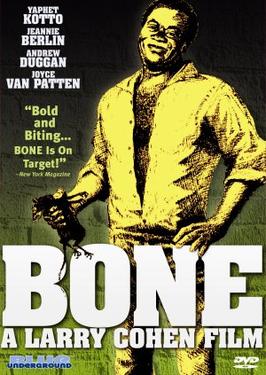
Bone is a 1972 American black comedy crime film written, produced, and directed by Larry Cohen in his directorial debut. It stars Yaphet Kotto, Joyce Van Patten, and Andrew Duggan. The film tells the story of a home invasion perpetrated by Kotto's character, who soon realizes that his victims are less wealthy and far unhappier than they initially appeared.
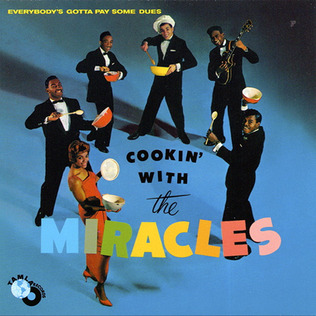
Cookin' with the Miracles is the second studio album by the American R&B group the Miracles. It was released on November 13, 1961, on Motown's Tamla label. Berry Gordy and Smokey Robinson co-wrote most of the songs, including the two charting singles "Ain't It Baby" and "Everybody's Gotta Pay Some Dues". Another single, "Mighty Good Lovin’" b/w "Broken Hearted", was issued in between those two. However, only "Broken Hearted" appears on the album, featuring a different vocal take to the single version. The album is composed mostly of upbeat R&B tunes with steady string riffs, like "Determination" and "Broken Hearted". A cover of the jazz standard "Embraceable You" by George & Ira Gershwin is also included. "That's The Way I Feel", also from this album, was chosen for the soundtrack of the award-winning 1964 Ivan Dixon film Nothing But a Man.

The Liberation of L.B. Jones is a 1970 American neo noir film directed by William Wyler, his final project in a career that spanned 45 years.
"Mickey's Monkey" is a 1963 song recorded by the R&B group the Miracles on Motown Records' Tamla label. It was written and produced by Motown's main songwriting team of Brian Holland, Lamont Dozier, and Eddie Holland, who later went on to write two more Miracles hit singles, the Top 40 "I Gotta Dance to Keep From Crying", and the Top 20 "(Come 'Round Here) I'm The One You Need". This was an unusual writing situation for the Miracles, as most of their songs were generally composed by the group members themselves.
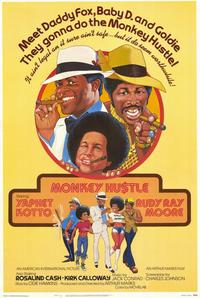
The Monkey Hustle is a 1976 American blaxploitation film written by Odie Hawkins and Charles Eric Johnson. It stars Yaphet Kotto as Chicago con-man and "hustler" Daddy Foxx and Kirk Calloway as his teenage apprentice. Co-stars include Thomas Carter, Rudy Ray Moore, and Rosalind Cash.
Michael Roemer is a film director, producer, and writer. He has won several awards for his films, which include Nothing But a Man and The Plot Against Harry. He is the recipient of a Guggenheim Fellowship. A professor at Yale University, he is the author of Telling Stories.

Badge of the Assassin is a 1985 television film starring James Woods, Yaphet Kotto and Alex Rocco. It was directed by Mel Damski. The film first aired on the Columbia Broadcasting System network on November 2, 1985. The film's production company was Blatt-Singer Productions.
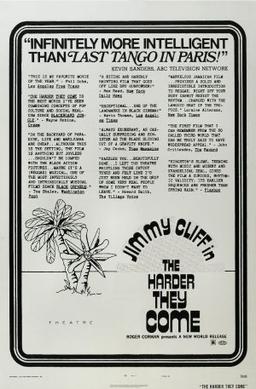
The Harder They Come is a 1972 Jamaican crime film directed by Perry Henzell and co-written by Trevor D. Rhone, and starring Jimmy Cliff. The film is most famous for its reggae soundtrack that is said to have "brought reggae to the world".
Othello is Liz White's dramatic adaptation of William Shakespeare's Othello. An all black cast and crew, including actor Yaphet Kotto, created the film.
